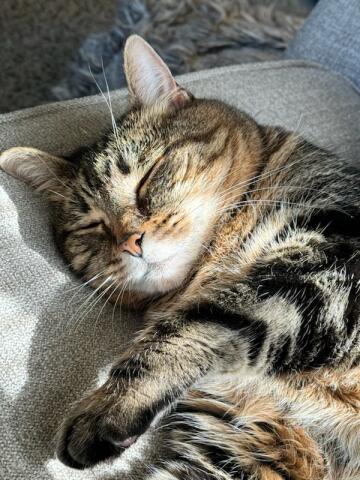What to say to people who say this kinda of thing? Usually I just say “ok then”

Some variation of the below:
Can I have your phone with the messaging apps unlocked?
Can I log into your personal email?
Can I see your tax returns?
Can I set up cameras and microphones in your house?
Can I place a GPS tracker on your car?

It also works with opening up the info to anyone, not just you. That’s one of the key issues, even if a trusted party is accessing the info there’s a chance that a malicious party can get access too. Or the trusted party becomes malicious later (government changes, company changes hands, etc.)
People generally don’t want everything in their home live streamed 24/7. If anything it has the potential for abuse, like if someone knows when you’ll be out of home for a few hours

Insurance companies in some countries give you a discount if you agree to put a tracker on your car…

Or use their app on your phone, which will “detect your driving patterns” and adjust your rates accordingly.
But honestly, even without all that, modern cars already have trackers and Internet connections even without your knowledge. (Mine did a couple of impromptu OTA updates for the media center at the beginning. It also has an SOS button on the roof, which you need to be subscribed to use, but can activate the subscription through the button. This implies there is a GPS tracker, as well as a cellular connection).

“Arguing that you don’t care about the right to privacy because you have nothing to hide is no different than saying you don’t care about free speech because you have nothing to say.” - Edward Snowden

“Okay, then hand me your phone unlocked and give me as much time as I want to poke around your browser history, files, and photos.”

Medical privacy is a great example.
Consider a situation like Texas right now where abortion went from a normal, legal thing to something that you can be fined and jailed for.
Would such a person be OK with the state having access to their medical records so they could jail or fine them?
People need to understand that much of privacy precautions are “layers” of security against “what if” scenarios that can sometimes be very real.

I take out a pad and pen, “what’s your bank credentials? Also, your [social media] credentials? I won’t use it against you. Promise. … No? I thought you have nothing to hide?” I put the pad away, and hold out my hand, “let me see you phone. I want to look through your pictures and internet history. … No again? Huh. I guess you do care about privacy.”

I usually ask them for their phone

“well, let me come over to your house uninvited and walk around the rooms looking through your personal belongings”.

I have a friend / colleague who was a bit like this. It is a “see it to believe” situation. For her it was when she was at work and she watched her mouse stat moving on its own.
When she thought about how she never did anything bad on her work computer, but sometimes accessed her personal email… She got it.
And now she pays closer attention to things. Like in our city you’re pinged via WiFi when you get on a bus, but you can opt-out or jut turn of your WiFi, so she does that. And she makes email aliases now too. Nothing too serious, mind you, but she is 50 and figuring this out on her own and then teaching her friends and colleagues about it which is way better than going down the rabbit hole. Now there’s a bunch of boomers refusing to use Teams or access work email on their personal devices because she explained that they do have things to hide: the names and ages of their children and grandchildren, where they go for drinks after work, what they watch on YT, etc.
I don’t get into it with people though. People just write me off as some nerd, which is not the case.

I guess they think they have nothing to hide, because they don’t know, or don’t care about, how their own information can be used against them.
Because it doesn’t happen in an obviously invasive manner, they don’t think it’s a big deal. It’s harder to associate an abstract concept to actual value.

We’re entitled to a reasonable amount of privacy, such as locks on our doors and curtains on our windows, why shouldn’t reasonable privacy also apply to our lives online?

That’s a choice they can make for themselves, not a choice tech companies and governments should make for everyone. If they want to trade their privacy, and I don’t - fine. All I want is the power to choose and know that choice will be respected.

deleted

If they’re not arguing in good faith my advice is don’t argue. Don’t roll around with pigs - you just get covered in shit and the pigs like it.

I usually ask them to hand me their phone while its unlocked and that really makes some people think. Its funny because at the same time i have so little to hide that the only reason i have a passeord on my phone is because it makes stealing it harder. But im not gonna hand my data some random company just to watch braindead 30 second videos.

Depends on the person, but sometimes things such as:
“Is there anything you do, watch, listen to, say or have done in the past, which is currently illegal in another country?”
“Did you see how in the US, some states have just recently made abortion illegal, and in others, you can get in trouble with the police for wearing clothes which they don’t think match your birth gender? Both things were perfectly legal a few years ago”
“Imagine it’s 2024 and mandateless unelected UK Prime Minister Rishi Sunak says model railways are offensive to motorists, so they’ve banned them”
“Do you think Facebook’s going to defend your privacy when the government makes model railways illegal, Dad?” :P

If you saw a powerful but drunk person hit and run a child would you not report it to the police?
In the old days the powerful person would hire a private investigator to learn how to make your life misery to put you off testifying.
Nowadays they just need your internet history… unless you are fine with assholes getting away with killing kids of course.

Well if you live in a democracy you should. It’s not about your data alone, its everyone else’s. It’s social media company XYZ determining how each individual is going to vote, then, on election day sending all people on one side get out and vote messages, and sending people on the other side a tsunami of unrelated bs to make sure they don’t know about the election. Or push a bunch of fakenews to make them feel both sides are the same and why even vote?
Do this in a couple key areas and you only need to hit a few tens of thousands of people to turn a presidential race.
We know it can be done because it already has been. If you live in a democracy you should care a good deal about privacy, even if you somehow have nothing to hide

a healthy democracy requires others to have privacy. people like investigative journalists need to be able to blend in with the crowd and expose government wrongdoing
blending in the the crowd is the important part: if everyone cares about privacy, nobody sticks out for caring about privacy… but if nobody cares about privacy, the investigative journalist suddenly looks really obvious and can be targeted much more easily
if someone doesn’t think they have anything to hide, that’s fine (wrong, but fine) however they can help to make sure the government acts appropriately simply by not splashing data around everywhere for all to see
